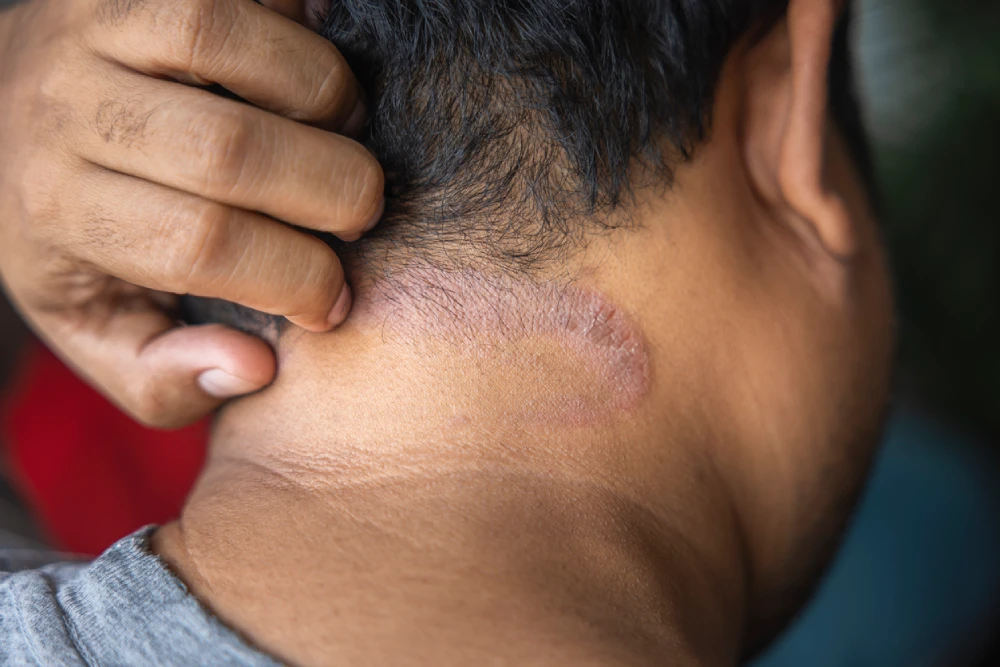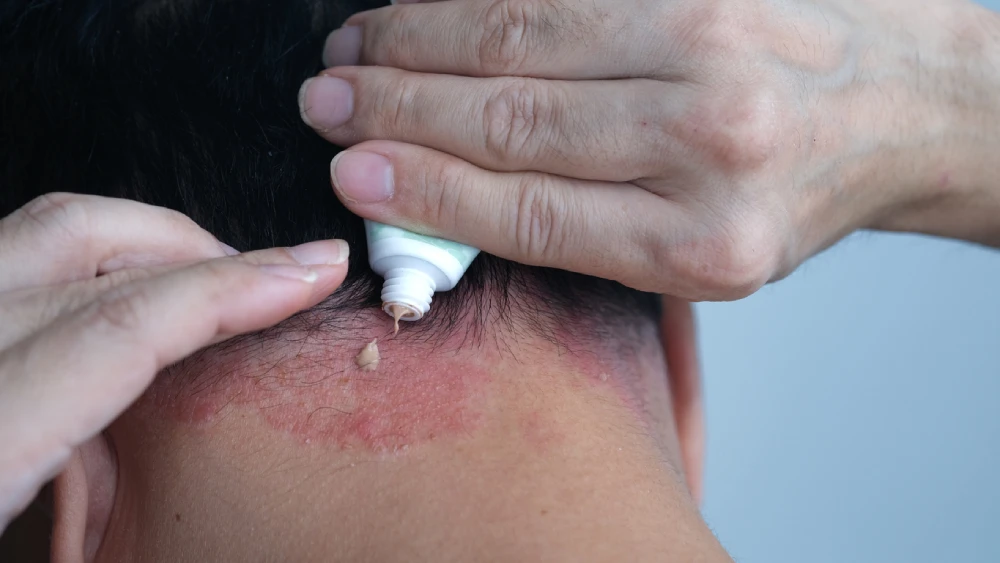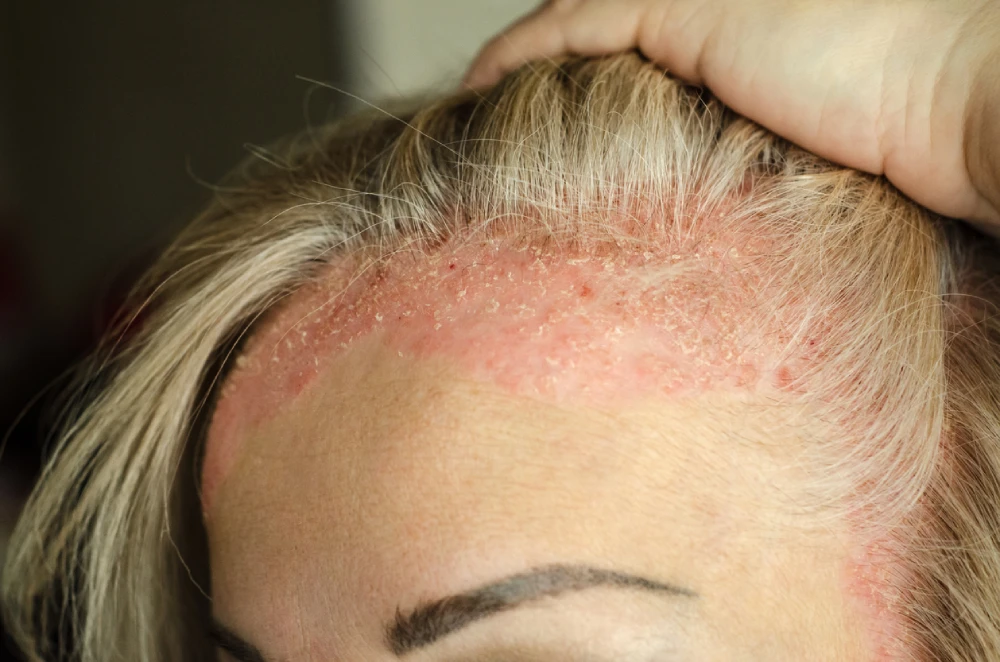Psoriasis is a skin condition that impacts millions, with the Canadian Dermatology Association claiming one million Canadians, and upwards of 125 million people worldwide are affected.
Scalp psoriasis is a form of this condition, and causes discomfort, irritation, and often frustration. For those living with it, the daily challenges can be overwhelming—itching, flaking, and visible redness may impact confidence and overall well-being. But with the right treatment approach and lifestyle adjustments, relief is possible.
Whether you’re newly diagnosed or have been managing symptoms for years, this guide provides a comprehensive understanding of scalp psoriasis, from its causes to treatment options and natural remedies.
Let’s dive into the details to uncover actionable ways to manage scalp psoriasis effectively.
Understanding Scalp Psoriasis – What Is It & Who Is Affected?
Scalp psoriasis is a chronic skin condition characterized by red or purple patches covered with silvery-white or gray scales.
Unlike dandruff or seborrheic dermatitis, scalp psoriasis often extends beyond the hairline, affecting the forehead, neck, and even the ears. It is not contagious but can significantly impact quality of life due to its persistent and visible nature.
How Scalp Psoriasis Differs From Other Scalp Conditions
Understanding the difference between scalp psoriasis and other conditions like dandruff is crucial. While dandruff causes flaky skin without redness, scalp psoriasis often presents with inflamed patches that may itch or burn.
Seborrheic dermatitis, another common scalp issue, produces yellowish, greasy scales compared to the dry, silvery scales of psoriasis.
Correct diagnosis by a healthcare provider ensures the most effective treatment.
Who Is Affected by Scalp Psoriasis?
Scalp psoriasis can affect anyone, though certain groups are more at risk. According to the Canadian Association of Psoriasis Patients, 45-56% of people already diagnosed with psoriasis face this condition.
Furthermore, individuals with a family history of psoriasis or other autoimmune disorders are particularly susceptible. It can develop at any age and is the most common place for psoriasis to appear in children, but it’s most commonly diagnosed between ages 15 and 35.
Environmental factors like stress, smoking, and alcohol consumption may exacerbate symptoms, highlighting the importance of a healthy lifestyle.

Scalp Psoriasis Symptoms
Recognizing the symptoms of scalp psoriasis is the first step toward managing the condition. They can range from mild to severe and may include:
- Red or purple bumpy patches: These are often inflamed and covered with scales.
- Silvery-white or gray scales: These thick scales are a hallmark of the condition.
- Dry scalp: Chronic dryness is common and can lead to cracking or bleeding.
- Itching: Persistent itching can significantly affect daily life.
- Dandruff-like flaking: Flakes may appear on clothing or bedding, often mistaken for dandruff.
- Soreness and bleeding: Scratching or irritation can cause the skin to break, leading to discomfort.
- Hair loss: Temporary hair loss may occur due to scratching or inflammation.
If you experience any of these symptoms, consult your healthcare provider for an accurate diagnosis and treatment plan.
What Causes Scalp Psoriasis?
The Cleveland Clinic explains that scalp psoriasis is an autoimmune condition where skin cells reproduce faster than they should, causing them to accumulate on the scalp’s surface before they can be shed. The result? Thick, scaly patches and inflammation.
While the exact cause of scalp psoriasis is not fully understood, several contributing factors are known. Some factors that can trigger or worsen scalp psoriasis include:
- Stress: Chronic stress can flare symptoms, making stress management essential.
- Skin trauma: Cuts, scrapes, or even tight hairstyles may trigger new patches.
- Cold weather: Dry air and low humidity exacerbate dryness and scaling.
- Infections: Strep throat or other infections can act as triggers.
Understanding these causes helps identify potential triggers, empowering you to manage flare-ups more effectively.

Scalp Psoriasis Management & Treatment Options
Although there is no cure for scalp psoriasis, several treatments can alleviate symptoms and improve quality of life. Here’s a breakdown of the most effective options.
Over-the-Counter Products
Many OTC products offer relief for mild scalp psoriasis. Some of these include:
- Salicylic acid: Salicylic acid in concentrations from 3–10%, softens and removes scales. There are many OTC options available, however, for an affordable solution, talk to your PharmaChoice pharmacist about Option+ products.
- Coal tar: This ingredient slows skin cell growth, reducing scaling and inflammation.
- Specialized shampoos and conditioners: Look for products specifically formulated for psoriasis, containing active ingredients, such as those listed above.
Topical Treatments
When OTC products aren’t strong enough to support your needs, topical prescriptions may be necessary, such as:
- Topical corticosteroids: These reduce inflammation and itching.
- Vitamin D3 derivatives: Calcipotriol (Dovonex®) or a Calcipotriol/Betamethasone ointment can provide relief by helping to slow skin cell growth.
Some other over-the-counter topical solutions for scalp psoriasis may include things like retinoids and calcineurin inhibitors, which offer alternative approaches for stubborn patches.
Phototherapy
For moderate to severe cases, phototherapy offers an alternative treatment. Phototherapy uses ultraviolet light to help slow the rate of growth while easing inflammation.
UV combs are ideal for home use, while in-clinic treatments may be recommended for widespread psoriasis.
Systemic Treatments
In severe cases, systemic treatments may be necessary, working to target the immune system directly, These notably include:
- Oral medications: Methotrexate and cyclosporine suppress immune activity.
- Biologics: Injected treatments like adalimumab block specific immune pathways to reduce inflammation.
Always consult your healthcare provider before starting any treatment to ensure it’s safe and effective for your needs.
Scalp Psoriasis Natural and Home Remedies
In addition to medical treatments, several natural and home remedies may provide relief:
- Aloe vera: Known for its soothing properties, aloe vera can reduce redness and inflammation.
- Olive or coconut oil: These oils help moisturize the scalp and loosen scales.
- Anti-inflammatory diet: Foods rich in omega-3 fatty acids, such as salmon and walnuts, may help reduce inflammation.
- Managing stress: Techniques like yoga, meditation, and mindfulness can help control flare-ups caused by stress.
While these remedies may not replace medical treatments, they can complement your care plan and improve overall scalp health.

Learn More About Scalp Psoriasis at Your Local PharmaChoice Pharmacy
Living with scalp psoriasis can be challenging, but effective management is possible. Understanding the condition, identifying triggers, and choosing the right treatments are essential steps toward relief.
If you’re struggling with scalp psoriasis, visit your nearest PharmaChoice pharmacy. Our healthcare providers can guide you toward the best treatments, including affordable solutions like Option+.
Don’t let scalp psoriasis control your life—take the first step toward relief today!



